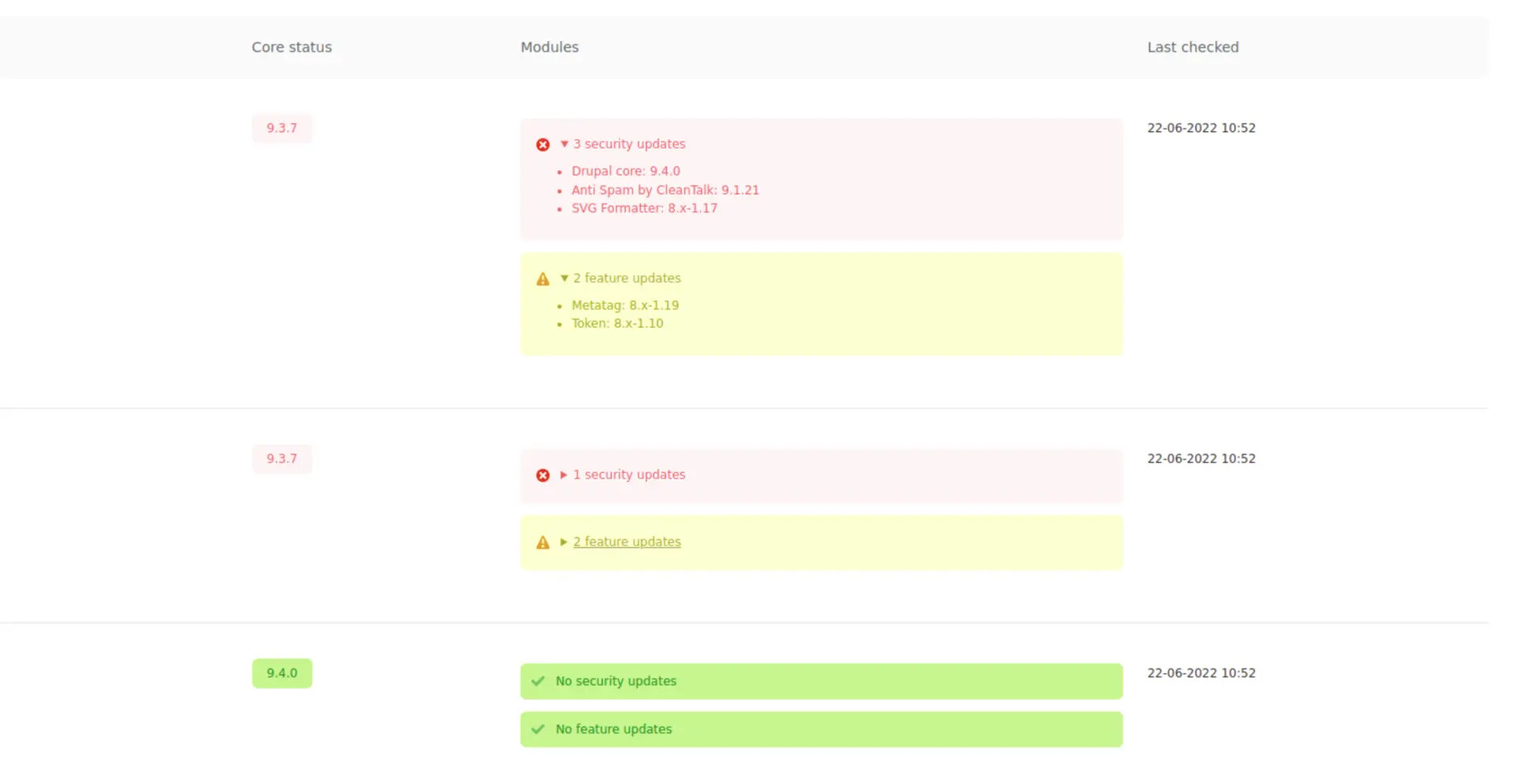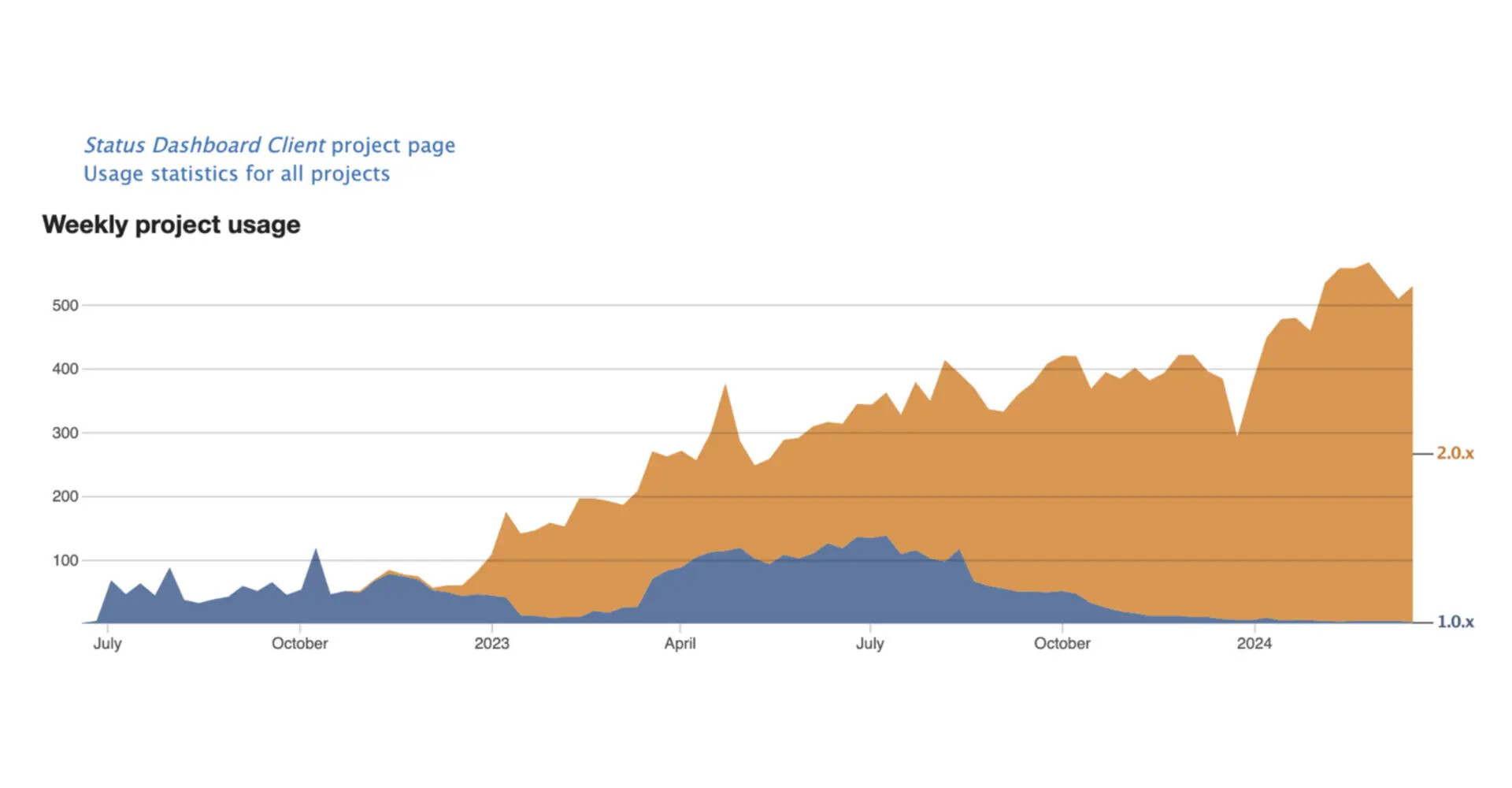Status Dashboard: All Drupal Project Updates at a Glance

At Solvy, we heavily utilize open source software, including Drupal. Drupal is an open source content management system (CMS) and web application framework that allows users to build and manage dynamic websites with a wide range of functionalities.
Drupal's Position in the Open Source CMS Community
Drupal holds a strong position within the open source CMS community; organizations, governments, and developers worldwide use Drupal for various purposes.
One of the key modules in Drupal is the Update Manager module, which provides an overview of both functional and security updates. This is incredibly important for maintaining a website, especially regarding security.
The Update Manager module is very useful for managing and maintaining a website: all updates are presented in an organized manner. However, for agencies or freelancers managing multiple websites, keeping track of all updates via this module can be challenging.
Open Source Software
In the dynamic world of web development, open source software plays a crucial role. The term 'open source' refers to a type of license that allows developers to view and modify the source codes. This contrasts with proprietary software, where the source code is confidential and only the compiled program is shared.
Some key characteristics and benefits of open source software include:
- Access to Source Codes: A source code is the human-readable version of the software. Users can view these source codes.
- Customizability: Users can not only view the source codes but also modify them according to their needs. Altering the source codes allows for the customization of the software.
- Distribution: Users can distribute and share the modified software with other users and developers, often subject to the conditions of the relevant open source license.
- Collaboration: Open source projects encourage users and developers to collaborate on improving and expanding the software.
Transparency: The software development process is open and accessible.
The Importance of Security Updates
The importance of security updates for websites cannot be overstated. These updates play a crucial role in maintaining the safety and integrity of a website:
- Security Updates Address Known Vulnerabilities: They often focus on closing known security gaps and vulnerabilities in the software. Regularly updating a website ensures it is more resilient against potential attacks from malicious actors.
- Protection of Sensitive Information: Websites often contain sensitive information, such as user data and personal details. Failing to keep security patches up to date increases the risk of data breaches, which can lead to serious consequences for both the website owner and users.
- Prevention of Malware and Virus Infections: Unsecured websites are at risk of being infected with malware or viruses. Security updates often include improvements to detect and block these threats, keeping the website safer.
- Building User Trust: Users rely on websites being secure, especially when providing personal information or conducting transactions. By regularly applying security updates, a website owner demonstrates a commitment to ensuring user safety.
- Compliance with Laws and Regulations: In some cases, laws and regulations require websites to implement security measures to protect user privacy. Regularly updating security patches helps maintain legal compliance.
The Drupal community has a proven method for addressing security issues and has a team of experienced professionals dedicated to safety. Updates are released quickly and always include detailed information about the nature of the vulnerability and the solution. As an active member of this community, Solvy strives to contribute to the goal of a safer web. Therefore, we aim to elevate the monitoring process of Drupal projects for agencies, freelancers, and anyone managing multiple websites.
Status Dashboard Module
To contribute to the community and enhance the effectiveness of implementing security updates, Solvy's development team has optimized the Drupal module specifically for agencies and freelancers. Like the previous module, it provides an overview of all updates but now in an organized manner per website. This allows you to easily see the number of available updates and their urgency for each website. When you select the specific overview for a particular website, you gain access to all updates and the update history.
Solvy's development team has implemented a set of two modules, making it simple to monitor the status of any number of Drupal-based websites:
1. Status Dashboard Module
- This module provides an overview of all monitored websites, including:
- A list of installed modules
- The core version
- A list of available security updates and feature updates
- The date of the last status check
- It also offers a way to add websites to the monitored set and a flexible mechanism for configuring email notifications.
2. Status Dashboard Client Module
- This module is responsible for receiving information from the Drupal Core Update Manager module and exposing it to the Status Dashboard module.

Contributing to the Drupal Community
Solvy has shared the development process of this module with the entire Drupal community. By doing so, Solvy contributes to improving the software and expanding its functionalities, preventing other developers from having to repeat the same work. Currently, around 40 agencies and freelancers are using this module, collectively monitoring over 500 websites.
